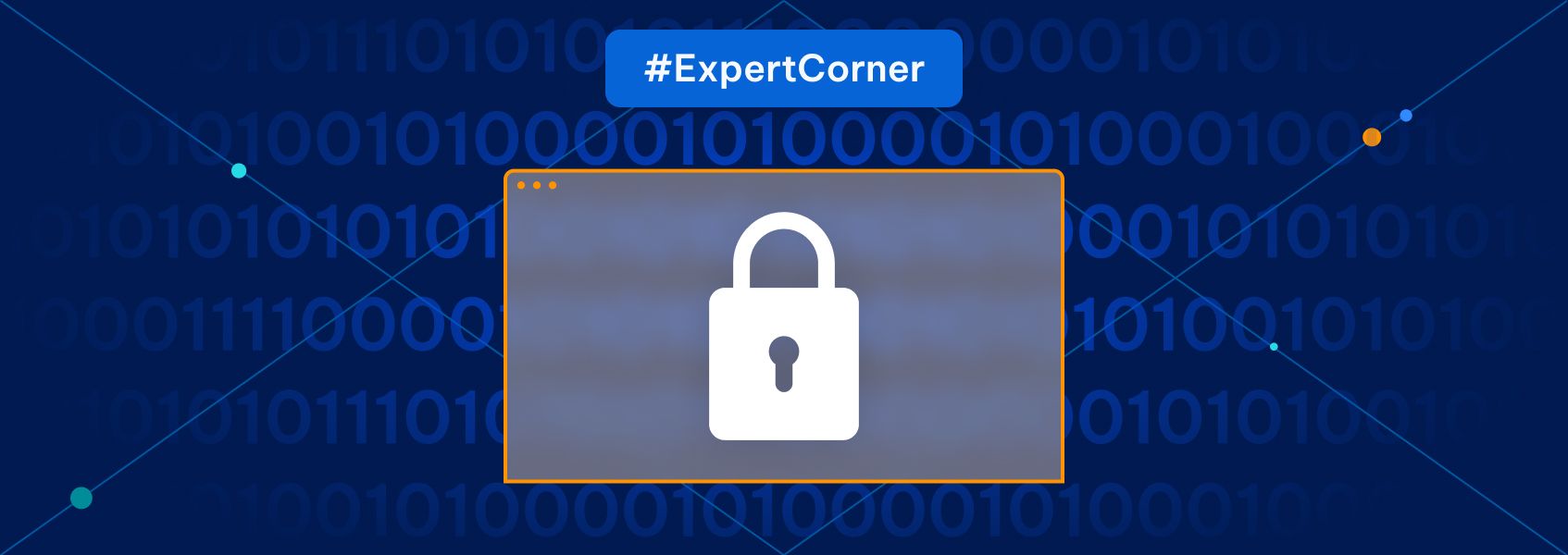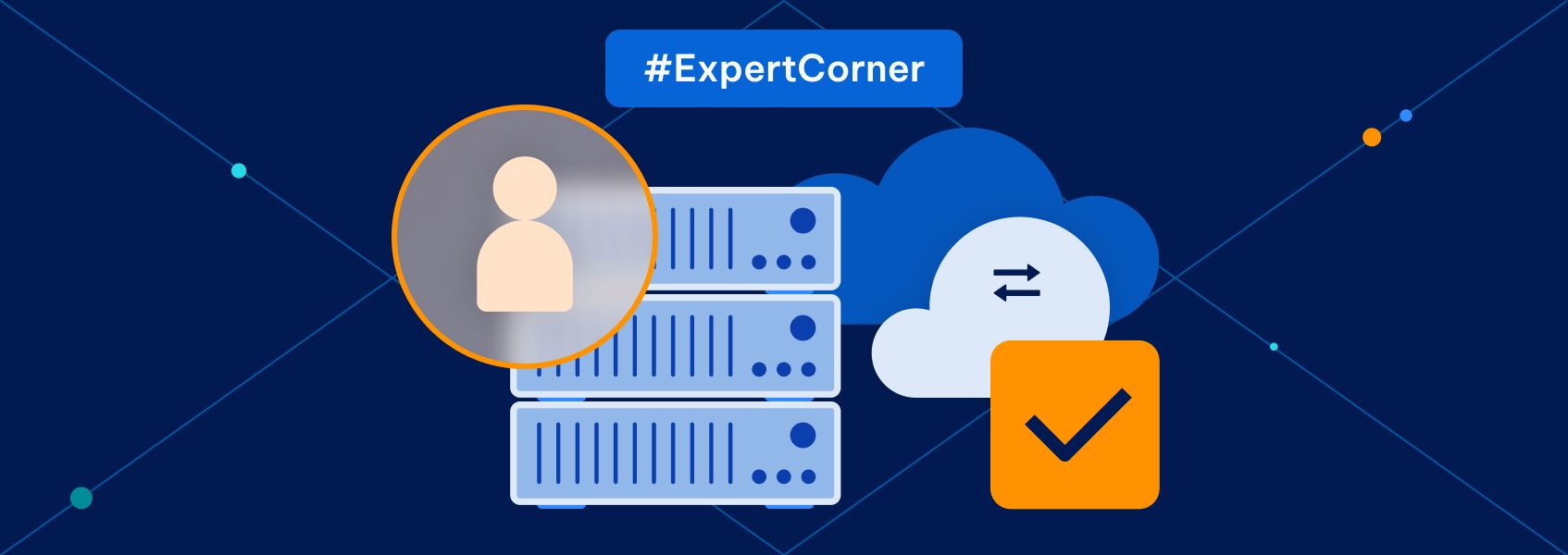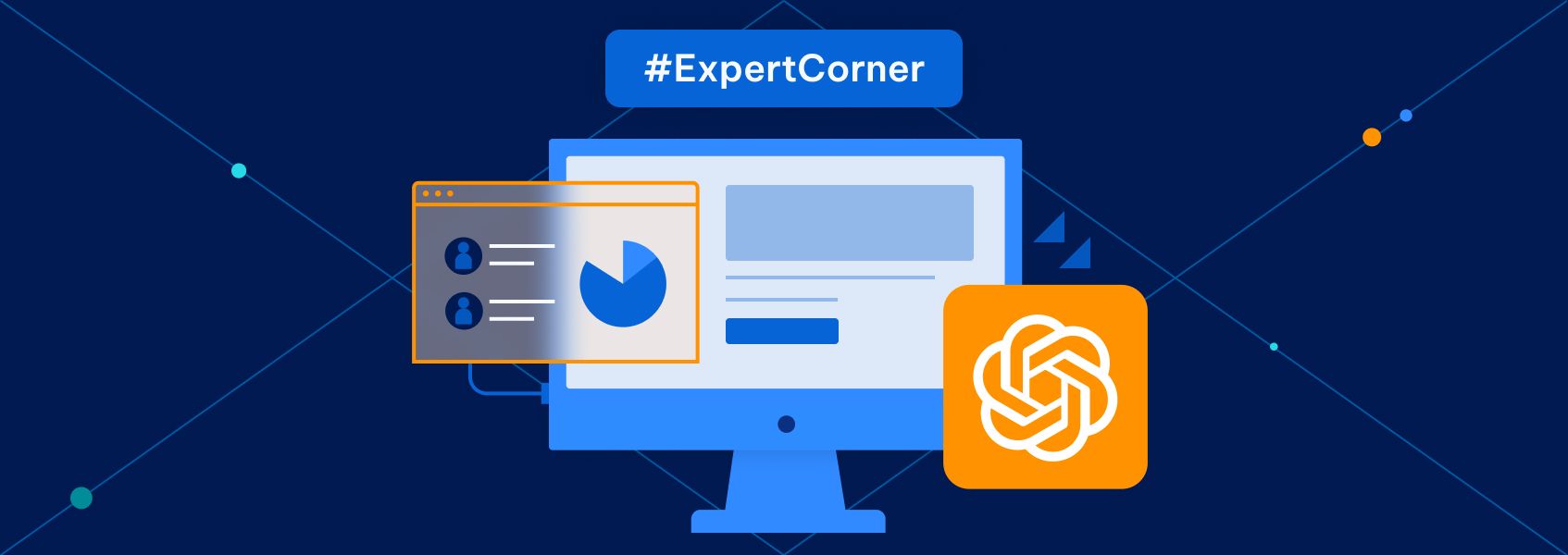What Makes a “Clean” Proxy and Why It Matters
Expert corner

Fabien Vauchelles
Choosing to work with proxies is a practical step for any business looking to access or protect data. However, once you move past that decision, another important question arises: which type of IP will best suit your use case?
You might consider Residential Proxies for their anonymity, or Datacenter Proxies for their speed. Mobile Proxies may be essential when your goal is to appear as a real mobile user. Depending on what matters more, it may even make sense to mix all three.
Still, proxy type alone doesn’t guarantee performance. If the IPs themselves aren’t clean, your setup will likely fail regardless of the category. This article explains what makes a proxy clean and why that detail matters more than you may realize.
What Is a Clean Proxy?
Your IP’s history matters just as much as its source or functionality. If it’s been flagged, cleanliness becomes the deciding factor. Here’s what makes an IP address clean:
- It is not flagged by major anti-abuse systems
Clean proxies are free from historical abuse signals. They don’t appear on global threat intelligence platforms, which act as the internet’s collective memory for bad behavior.
These platforms, such as AbuseIPDB , Spamhaus , and Project Honey Pot, share their data with cloud providers, firewalls, and anti-bot tools. Once an IP is labeled risky, its success rate drops and you usually start seeing proxy errors . A clean IP avoids that. That’s why it works.
- It comes from trusted ASNs
Every IP address comes from an ASN or Autonomous System Number. The ASN tells the internet who controls the IP block. That controller might be a residential ISP, such as Vodafone, a mobile network like T-Mobile, or a hosting provider like OVH.
And their history affects yours.
Even if your proxy IP hasn’t been flagged before, the ASN it belongs to might carry a known reputation. If that ASN has been abused for scraping, spam, or automation, some sites may flag your IP simply because it comes from a known abusive source.
- It is not flagged by domain-specific blacklists
Major platforms, including Amazon, Google, TikTok, Facebook, LinkedIn, and Reddit, operate private, machine-learning-powered IP reputation systems. These models track behavioral signals and silently downgrade or reject connections they consider suspicious.
The challenge is that you cannot audit these blacklists. A proxy flagged by one of these systems may still pass public IP reputation tools, but its traffic will be throttled, redirected, or simply dropped. A clean proxy, in this context, is one that these systems have not marked as suspicious.
If a proxy passes the checks above, you can treat it as clean. That means it’s unlikely to trigger blocks or get deprioritized, assuming the rest of your setup follows best practices.
But if any of those checks fail, the risk quickly increases. A “dirty” IP only has to exist in a flagged system. Even with flawless scraping logic, it may be throttled, shadow-banned, or blocked entirely. That’s why cleanliness is the baseline.
Key Characteristics of Clean Proxies
Now that you know what makes a proxy clean, let’s discuss the features that every clean proxy must possess and how you can verify that your IP list is clean enough for whatever task you are looking to use them for.
- Good reputation score
The first characteristic of a clean proxy is a strong reputation score. This is something you can verify with public tools like Spamhaus and AbuseIPDB . Let’s walk through two real examples from IPRoyal.
We’ll start with the IP 71.142.255.70.
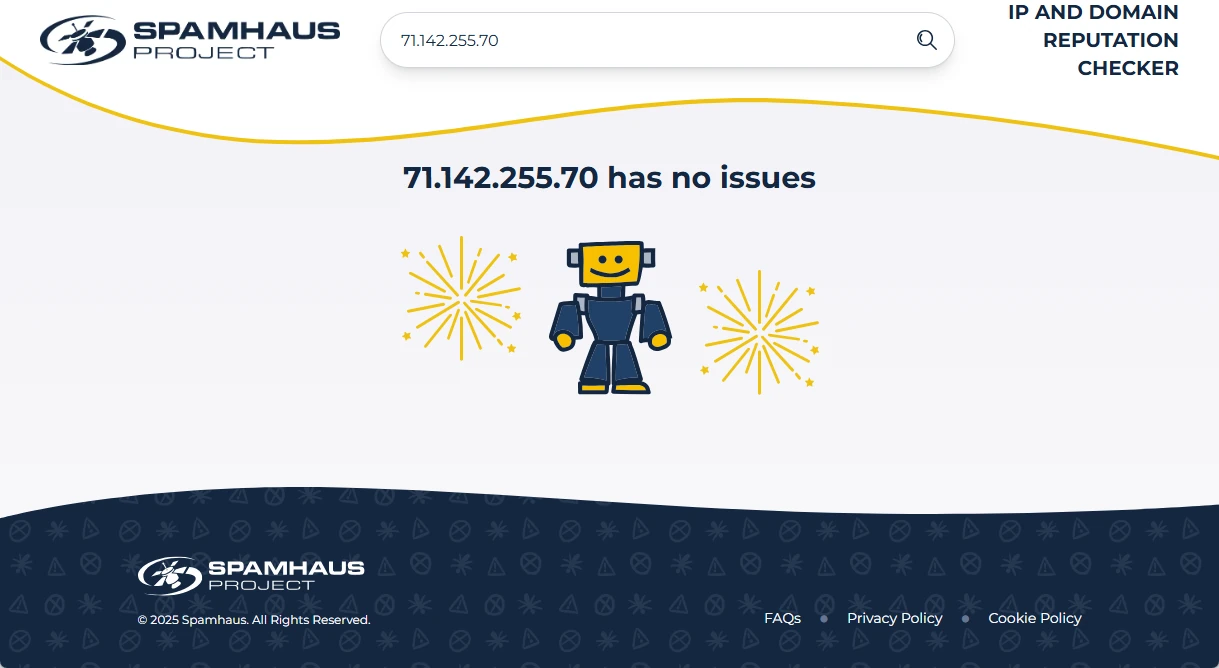
This IP shows no issues on Spamhaus, which is a good sign.
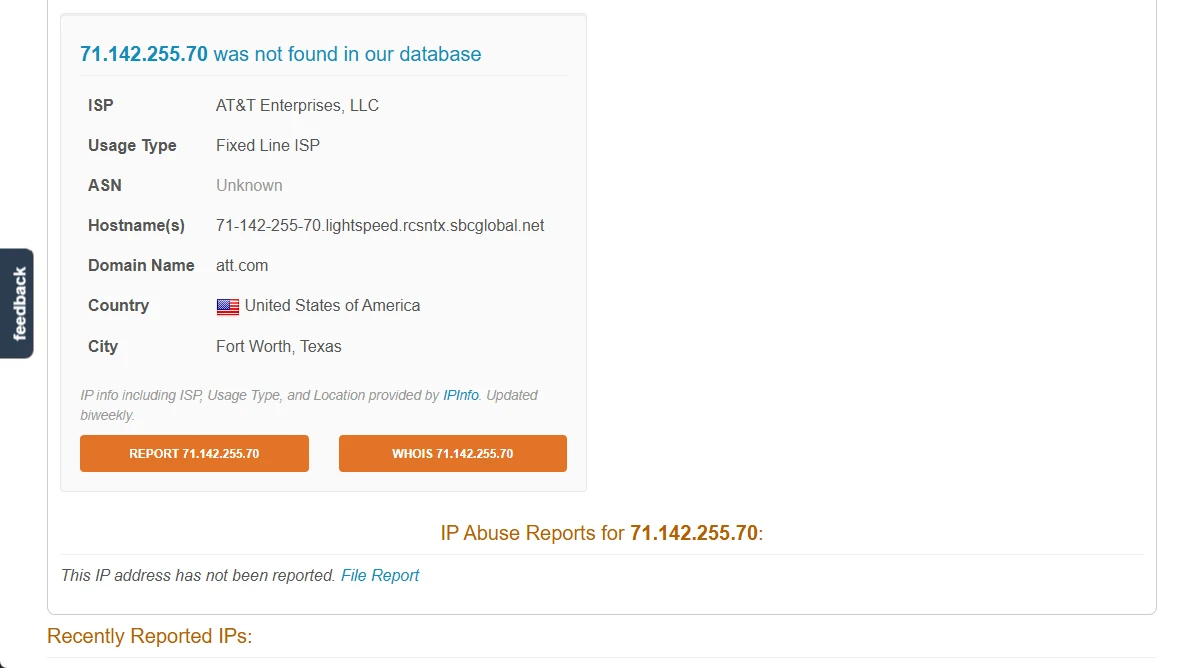
It’s also clean on AbuseIPDB. That gives us high confidence it hasn’t been involved in known abuse.
Now let’s look at a second IP: 148.75.104.225.
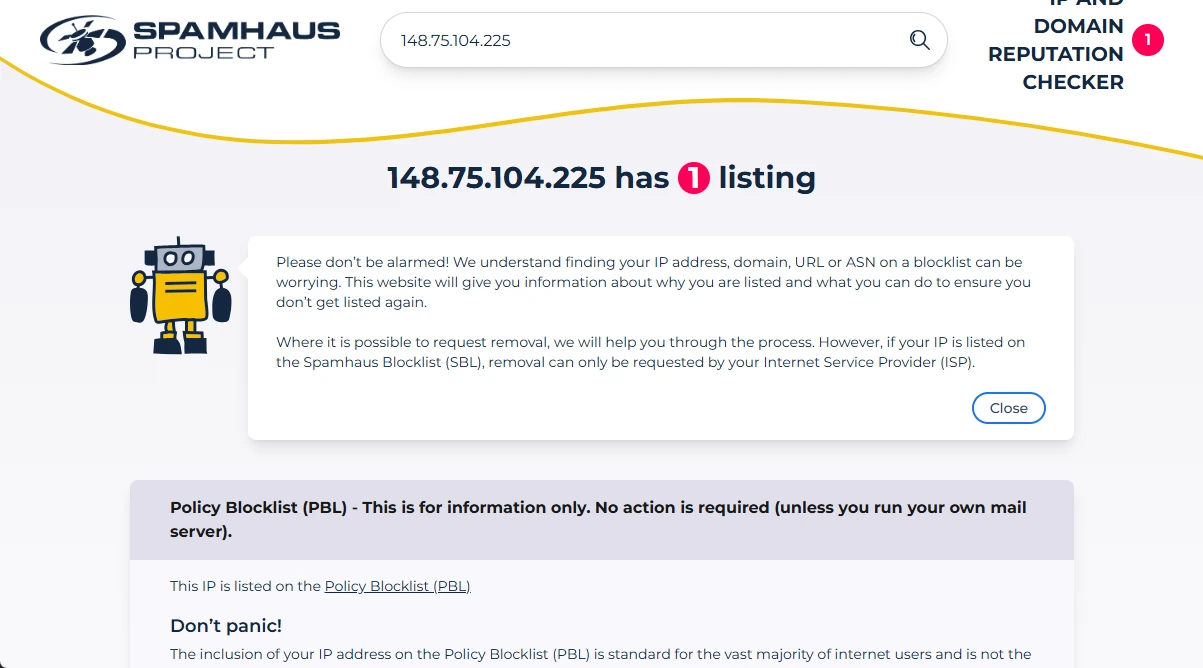
Here, we see one listing on Spamhaus. That alone doesn’t confirm risk, but it warrants a second check.
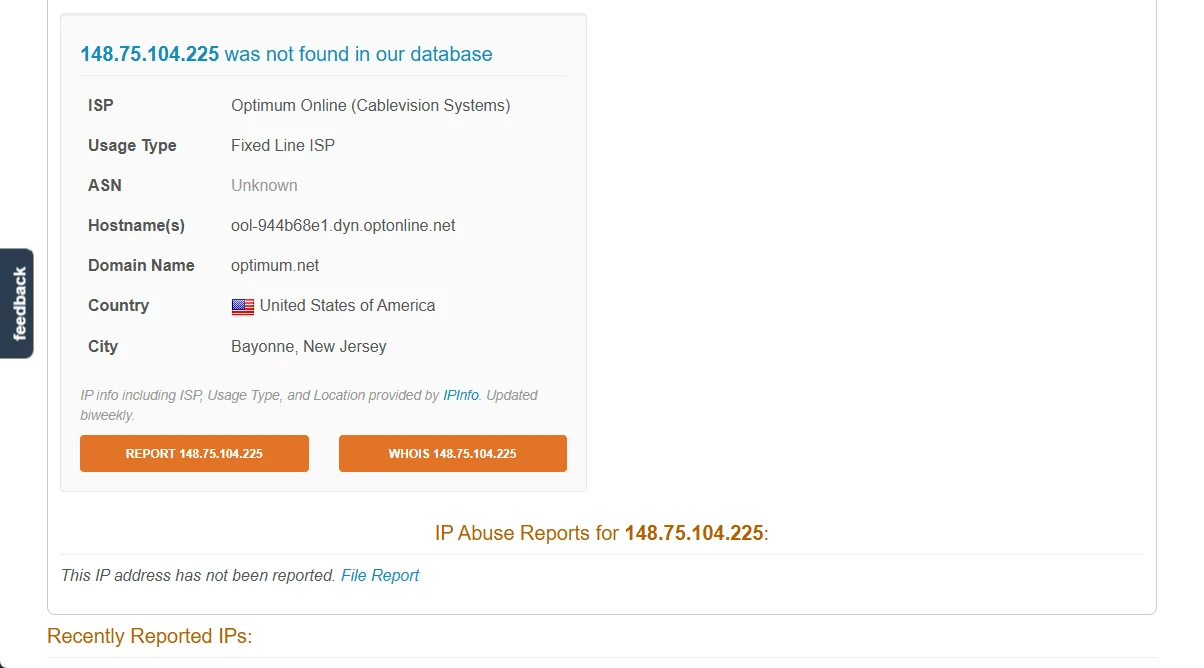
AbuseIPDB shows no issues for this IP. That’s why it helps to cross-check across multiple databases before making a call.
- Ethical sourcing
While there’s no scanner to confirm the origin of an IP from, responsible proxy providers will inform you upfront. The more openly a provider explains their sourcing model, the easier it is to trust the traffic flowing through their infrastructure.
For example, IPRoyal’s residential pool is built on Pawns.app, an opt-in bandwidth-sharing program. That means every IP is tied to a real device, with consent built into the system.
If a provider refuses to explain how it acquires its IPs, you should assume the worst. Poor sourcing leads to recycled, mislabeled, or even hijacked IPs, which often end up blocked regardless of their reputation score.
- Usage history
If an IP has been used for spamming, phishing, credential stuffing, or other abusive behaviors, it carries that baggage, even if public databases show it as clean. The absence of red flags on Spamhaus or AbuseIPDB doesn’t guarantee safety if a platform like Amazon or Google has already flagged it internally.
This is why a clean usage history must be paired with smart operational logic. Even the best proxies require retry and rotation systems in place. If one session encounters a soft block or gets throttled, your system should switch IPs, rotate headers, or back off temporarily.
- Leak protection
A proxy may pass every reputation test, but if it leaks your real IP through WebRTC or DNS, that session is no longer secure. Platforms now associate your clean IP with your real ISP address, linking two identities that were meant to stay separate. That creates noise in your traffic profile, which is enough to trigger a flag by internal risk models.
Clean IPs only stay clean when the session is isolated and the fingerprint is stable. To check for WebRTC leaks, you can use IPRoyal’s WebRTC Leak Test. It’s a quick way to confirm your setup isn’t leaking data you didn’t mean to share.
Why Clean Proxies Matter for Enterprise Use Cases
Here is why clean proxies matter for enterprise use cases:
Web Scraping
Web scraping at scale only works if your proxies stay clean. It may sound obvious, but today’s detection systems are anything but simple.
Platforms like Google, Amazon, and LinkedIn run machine learning models that silently score every connection attempt, flagging reused sessions, poor rotation patterns, and behaviors that indicate scraping. Even if your code is flawless, dirty IPs can trigger throttling, silent drops, or blocks.
Clean proxies give you a fair shot at getting through. However, staying clean requires operational logic that prevents IPs from being overexposed. That’s where tools like Scrapoxy.io come in.
It’s a proxy management software that automatically rotates IPs across requests, sessions, or even when it detects failure signals, such as HTTP error 403 or 429. Pair that with retry rules and smart backoff logic, and your scrapers behave more like real users, making them less likely to raise alarms.
For enterprises, this matters because scraping supports competitive intelligence, pricing strategy development, market validation, ad verification, and SEO analysis. A single misstep in proxy hygiene can endanger the entire operation.
Ad Verification and Brand Protection
Ad verification is only as good as the data you can see. If you are using questionable proxies, what you see is not always what users get. Malvertisers often detect scanning behavior and use cloaking techniques to serve clean, legitimate-looking ads to bots while showing harmful or fraudulent content to real users.
That means your system may falsely report zero issues, even as real people are exposed to fake or unsafe placements.
The same logic applies to brand protection. When your team tries to validate where your ads are showing or whether your brand is being impersonated, dirty proxies can get you blocked or fed misleading content. Instead of loading the real listing or site, the platform might serve a dummy version, or nothing at all. That makes clean proxies essential.
Cybersecurity & Fraud Prevention
When testing the security of your infrastructure, using a clean proxy is non-negotiable. Your system likely trusts your home or office IP, so it may not detect threats or vulnerabilities associated with that address.
But a proxy that’s already flagged as suspicious distorts the test in a different way. Your system may block it instantly, giving you a false sense of safety.
Clean proxies also play a crucial role in investigating phishing campaigns, credential stuffing sites, and shady domains. If your IP has a bad reputation or automation footprint, attackers may serve you a decoy version of the site: clean, empty, and seemingly safe.
That makes your forensic work unreliable. Worse, if the proxy leaks or is monitored, you risk exposing your identity and the purpose of your visit. In cybersecurity work, that defeats the mission.
Compliance & Reputation Management
Laws such as the General Data Protection Regulation (GDPR) and California Consumer Privacy Act (CCPA) now impose strict boundaries on how data is sourced, processed, and used.
Using proxies tied to unethical or undisclosed sourcing puts your operation at legal risk, especially if consent is missing or unclear. Regulatory penalties aside, the reputational impact of being linked to data misuse can be long-term and severe.
A clean IP pool gives you a defensible position. You can trace the network back to consenting users and maintain operational transparency across your scraping, ad verification, or automation stack. For enterprise teams, this reduces exposure and helps maintain credibility with regulators, platforms, and partners.
How IPRoyal Ensures Clean Proxies
IPRoyal offers a purpose-built proxy network of over 34 million clean IPs, spanning residential, datacenter, mobile, and ISP sources. Here is how it maintains a clean IP pool:
- 100% owned and operated infrastructure
Every proxy is built and maintained in-house. This eliminates the guesswork that often accompanies inherited abuse or mystery listings, providing clients with full traceability from source to session.
- Real-time reputation monitoring and blacklist checks
IPRoyal performs continuous scans across known blacklists and reputation systems, identifying risky IPs and correcting or replacing them before they impact delivery or access. This proactive approach prevents silent failures caused by outdated or flagged IPs.
- Ethical, compliant residential and mobile IPs
All residential and mobile IPs in IPRoyal’s network are sourced through an entirely opt-in bandwidth-sharing platform. Users give explicit consent, are compensated, and are covered under GDPR-compliant policies.
- Behavior-aware rotation and session logic
IPRoyal supports sticky sessions, dynamic IP rotation, and geo-targeting at the city, state, and ISP level. This allows you to maintain a consistent identity when needed or shift quickly across regions, mimicking natural user patterns that help you stay below detection thresholds.
- Continuous pool optimization and refresh cycles
Finally, IPRoyal continuously audits its network to detect overused or flagged IPs. It replaces them with fresh supply, keeping the overall pool clean and operationally strong. This is one of the key reasons enterprise users trust the platform.
Conclusion
Your next step should be to assess your current provider. Are they transparent about sourcing? Do their residential and mobile IPs come from consent-based programs? If not, your business could be exposed to compliance risks, unreliable traffic, or reputational harm.
